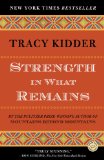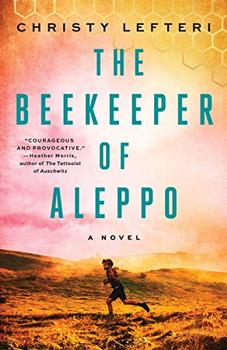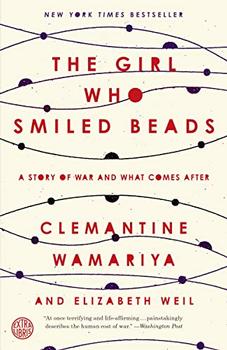Summary | Excerpt | Reading Guide | Reviews | Beyond the book | Read-Alikes | Genres & Themes | Author Bio

Critics' Opinion:
Readers' Opinion:
First Published:
Aug 2009, 304 pages
Paperback:
May 2010, 304 pages
 Book Reviewed by:
Book Reviewed by:
Amy Reading
Buy This Book
Deogratias Niyizonkiza faces a paradox at the beginning of Tracy Kidder’s book. He is a Burundian Tutsi who has survived the 1993 genocide to start a new life in America, and he is inescapably haunted by what he has just been through. But how can he remember the people he lost in the massacre and tame his own horrendous memories if Burundian culture prohibits even speaking the names of the dead? To gusimbura someone, to talk about them after they have died, is profane because it reminds people of loss, bringing something bad from the past into the present. Yet to not talk about the thousands of people brutally slaughtered throughout his country is to allow those events to vanish.
 Tracy Kidder’s solution to this paradox is to twist the chronology of Deo’s story in his telling of it. The first half of Strength in What Remains takes place in 1994, when Deo was pretty much catapulted into New York by an acquaintance who had obtained for him a business visa and $200 in cash. As Kidder tells about Deo making his way in New York, he flashes back to Deo’s former life in Burundi. A Senegalese baggage handler in the airport befriends him and settles him into a filthy, dangerous flophouse in the Bronx. He finds a job delivering groceries on the Upper West Side, but he doesn’t make enough for his own food, much less enough to pay for a doctor to treat his poor health. The flophouse becomes so bad he soon finds it more comfortable to sleep in Central Park. Between scenes of him carrying groceries up to ritzy apartments and suffering the casual racism of doormen and customers, Kidder interweaves scenes of him as a boy carrying stacks of cassava on his head over the steep hills between Butanza and the lake, moving with his family into hiding when ethnic tensions flared, attending primary school and picking eucalyptus leaves with which to be beaten for being late, and then finally attending medical school in Bujumbura.
Tracy Kidder’s solution to this paradox is to twist the chronology of Deo’s story in his telling of it. The first half of Strength in What Remains takes place in 1994, when Deo was pretty much catapulted into New York by an acquaintance who had obtained for him a business visa and $200 in cash. As Kidder tells about Deo making his way in New York, he flashes back to Deo’s former life in Burundi. A Senegalese baggage handler in the airport befriends him and settles him into a filthy, dangerous flophouse in the Bronx. He finds a job delivering groceries on the Upper West Side, but he doesn’t make enough for his own food, much less enough to pay for a doctor to treat his poor health. The flophouse becomes so bad he soon finds it more comfortable to sleep in Central Park. Between scenes of him carrying groceries up to ritzy apartments and suffering the casual racism of doormen and customers, Kidder interweaves scenes of him as a boy carrying stacks of cassava on his head over the steep hills between Butanza and the lake, moving with his family into hiding when ethnic tensions flared, attending primary school and picking eucalyptus leaves with which to be beaten for being late, and then finally attending medical school in Bujumbura.
As I read through this portion of the book, I admired the story itself but was frustrated with the telling of it. Deo’s life in these years was grueling and unjust, but it was not an unfamiliar story to me; in fact I was reminded of the fictional Biju in Kiran Desai’s The Inheritance of Loss. Many people come to Deo’s aid in New York, including a nun at St. Thomas More, an immigration lawyer, a couple in Soho. I wished that Kidder had put pressure on this story, questioning people’s motivations for helping Deo and drawing out his identity as a genocide survivor as well as an immigrant.
My objections melted away when I read the second half of the book. Here, Kidder himself appears as a presence in his own book, as he narrates his introduction to Deo and their collaboration on recording Deo’s story. Kidder writes, "I felt uncomfortable at times, during the two years or so when I was asking Deo my questions. Sometimes I felt that to remind him of the past was to traumatize him all over again. On several occasions I offered to stop my search for his story and let his memories die, if they would. I believe that once or twice, I sincerely hoped he would accept my offer." But Deo had his own reasons for wanting to break his silence.
Deo goes from being a homeless immigrant to graduating from an American college and medical school. Deo joins Partners in Health, Dr. Paul Farmer’s organization, which Kidder wrote about in Mountains Beyond Mountains. For the first time since leaving Burundi, Deo feels recognized by his colleagues, and he begins to pour out his story to anyone who will listen. Only now does Deo identify himself as a genocide survivor, so only now does Kidder revisit the events from the first half of the book and dig underneath to probe their meanings, in the process revealing how much Deo has kept dammed up as he reinvents himself in America.
As the action drew nearer to the genocide itself, right in the center of the book, I began to flinch in advance and to turn the pages tentatively, ready to snap the book closed if the words grew too disturbing. As it turns out, I skipped only one passage, though enough of it assaulted my eyeballs that I’ve been haunted by it ever since. Kidder’s subject presents him with an ethical question: how to represent violence and atrocity without turning it into horror-movie pornography. His solution is to tell what Deo saw in straightforward, uninflected, undramatized terms. And he is helped by the fact that Deo was himself a survivor, in hiding and on the run, but not a direct participant in the action.
This is a smart book for what it does not do. It does not attempt to get inside Deo’s head to guess what he might have been thinking. It does not try to psychoanalyze him once he starts talking about his trauma. It does not overly dramatize this story of extreme suffering and redemption, simply allowing the events to unfold on the page. And it does not attempt to puff out Deo’s story and make it represent more than it does. Kidder takes on the role of a reporter on Deo’s life, but his unusual narrative structure lends the story the grace and depth of a novel. It is a hybrid not unlike Deo himself, a new American citizen who could not have accomplished what he did without American resources and institutions, but who returns to Burundi to make his life’s work there. Deo’s life is extraordinary and I’m grateful that he agreed to gusimbura himself to share it with Tracy Kidder.
![]() This review was originally published in The BookBrowse Review in September 2009, and has been updated for the
May 2010 edition.
Click here to go to this issue.
This review was originally published in The BookBrowse Review in September 2009, and has been updated for the
May 2010 edition.
Click here to go to this issue.

If you liked Strength in What Remains, try these:

by Christy Lefteri
Published 2020
This unforgettable novel puts human faces on the Syrian war with the immigrant story of a beekeeper, his wife, and the triumph of spirit when the world becomes unrecognizable.

by Elizabeth Weil, Clemantine Wamariya
Published 2019
A riveting story of dislocation, survival, and the power of stories to break or save us.





The Funeral Cryer by Wenyan Lu
Debut novelist Wenyan Lu brings us this witty yet profound story about one woman's midlife reawakening in contemporary rural China.
Your guide toexceptional books
BookBrowse seeks out and recommends the best in contemporary fiction and nonfiction—books that not only engage and entertain but also deepen our understanding of ourselves and the world around us.